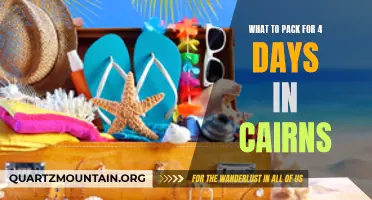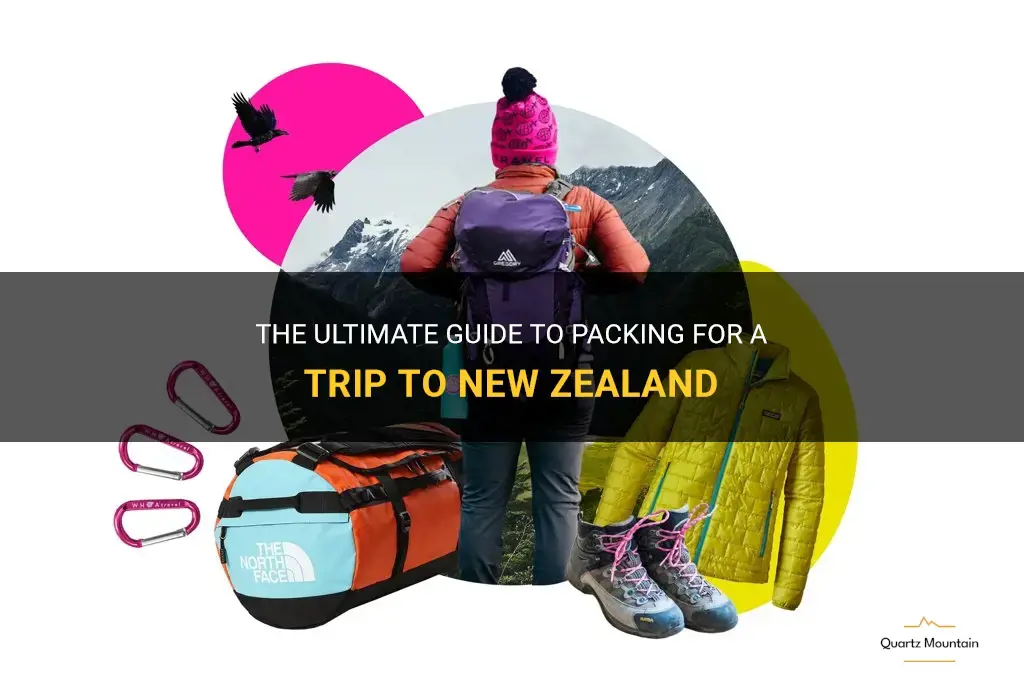
Are you planning a trip to New Zealand and feeling overwhelmed by all the things you need to pack? Don't worry, we've got you covered! In this ultimate guide, we'll walk you through everything you need to know about packing for a trip to New Zealand. From clothing and footwear to essential travel gear and outdoor equipment, we'll help you be prepared for any adventure that comes your way in the land of the long white cloud. So grab your suitcase and get ready to pack like a pro for your New Zealand adventure!
| Characteristics | Values |
|---|---|
| Climate | Varies depending on region and season |
| Clothing | Layered clothing, rain jacket, sturdy walking shoes |
| Adapter | Type I |
| Currency | New Zealand dollar |
| Time zone | New Zealand Standard Time (UTC+12) |
| Language | English |
| Plug sockets | Type I |
| Transportation | Rental car, public transportation, domestic flights |
| Emergency services | 111 (police, fire, ambulance) |
| Internet access | Widely available |
| Voltage | 230V |
| Travel insurance | Recommended |
| Visa requirements | Check with your country's embassy or consulate |
| Essential documents | Passport, driver's license, travel itinerary, accommodation bookings |
| Outdoor activities | Hiking, camping, wildlife spotting |
| Local customs | Respect for Maori culture, keep to marked trails |
| Food and drink | Fresh seafood, lamb, wine |
| Safety precautions | Take precautions against sunburn, insect bites |
| Medications | Carry necessary medications and a first aid kit |
| Emergency contacts | Keep a list of emergency contacts with you |
| Wildlife | Unique mix of native birds and animals, be aware of conservation efforts |
| Local attractions | Fiordland National Park, Milford Sound, Hobbiton |
| Cell phone coverage | Good coverage in urban areas, spotty in remote areas |
| Time of year to visit | Spring (September – November) and autumn (March – May) for mild temperatures and fewer tourists |
| Outdoor gear | Backpack, hiking boots, insect repellent, sunscreen |
| Photography | Bring a camera and extra batteries |
| Local customs | Maori language and customs, respect for nature and the environment |
| Medical care | Good healthcare system, consider travel insurance |
| Accommodation | Hotels, motels, hostels, camping sites |
| Communication | English is widely spoken, some knowledge of Maori phrases is appreciated |
| Local laws | Familiarize yourself with local laws and regulations |
| Etiquette | Be polite and respectful to locals and their customs |
| Food allergies | Inform restaurants about any allergies or dietary restrictions |
| Travel guides | Carry a travel guidebook or use online resources |
| Adventure activities | Bungee jumping, skydiving, jet boating |
| Sim card | Purchase a local sim card for mobile data |
| currency exchange | Exchange currency at banks or authorized currency exchange counters |
| Maps/directions | Carry a map or use a GPS device |
| Rainy weather | Pack a raincoat or umbrella |
| Packing essentials | Clothing, toiletries, medication, travel adaptors |
| Document backup | Make copies of important documents and keep them separate |
| Local delicacies | Try Maori hangi, Pavlova, and hokey pokey ice cream |
| Scenic drives | Great Ocean Road, Routeburn Track, Desert Road |
| Environmental sustainability | Support eco-friendly practices and conservation efforts |
| Shopping | Unique Maori crafts, wool products, and souvenirs |
| Communication apps | Use messaging and calling apps to stay connected |
| Water safety | Follow local water safety guidelines for swimming and aquatic activities |
| Beaches | Beautiful beaches, be mindful of changing tides and ocean conditions |
| Weather forecast | Check the weather forecast before heading out |
| Health and hygiene | Use hand sanitizer, stay hydrated, and practice good hygiene |
| Road rules | Drive on the left side of the road, follow local traffic laws |
| Emergency numbers | Keep the local emergency numbers saved on your phone |
| National parks | Abel Tasman National Park, Tongariro National Park, Mount Cook National Park |
| Camping equipment | Tent, sleeping bag, camping stove |
| Insect repellent | Protect yourself from mosquitoes and sandflies |
| Wildlife encounters | Take guided tours for safe wildlife encounters |
| Stay connected | WIFI is available in hotels, cafes, and public places |
| Travel apps | Use travel apps for navigation, language translation, and local information |
| Camping grounds | Make advanced bookings for popular camping grounds |
| Travel adapters | Type I plug adapter for New Zealand |
| Road trip planning | Plan your routes and stops in advance |
| Travel vaccinations | Consult a doctor for recommended vaccinations |
| Beach safety | Follow beach safety signs and guidelines |
| Emergency kit | Keep a first aid kit and emergency supplies handy |
| Hiking trails | Kepler Track, Tongariro Alpine Crossing, Hooker Valley Track |
| Sightseeing | Visit landmarks, museums, and cultural sites |
| Wildlife photography | Bring a telephoto lens for capturing wildlife |
| Medical conditions | Carry necessary medications and inform travel companions |
| Safety precautions | Avoid swimming in rivers and remote areas without lifeguards |
| Travel insurance | Have comprehensive travel insurance |
| Ferry travel | Consider taking a ferry to explore the islands |
| Sun protection | Wear sunscreen and protective clothing |
| Shop hours | Most shops close around 5-6pm |
| Travel adapter | Bring a universal travel adapter |
| Local festivals | Attend local festivals and events |
| Cultural experiences | Attend a Maori cultural performance or visit a marae |
| Accommodation booking | Book accommodation in advance, especially during peak season |
| Travel itinerary | Plan your trip to include time for leisure and relaxation |
| Language app | Use language learning apps to learn basic Maori phrases |
| Outdoor gear rental | Rent outdoor gear if you don't want to bring your own |
| Wildlife reserves | Visit wildlife reserves and sanctuaries |
| National parks | Explore New Zealand's stunning national parks |
| Local cuisines | Try traditional Maori dishes |
| Local beverages | Sample local wines and craft beers |
| Rail travel | Consider taking scenic rail journeys |
| Tipping culture | Tipping is not expected in New Zealand |
| Travel insurance | Ensure you have adequate travel insurance |
| Travel documents | Keep your passport and travel documents secure |
| Festivals and events | Check for upcoming festivals and events |
| Public holidays | Plan your trip around public holidays |
| Urban exploration | Explore the cities and towns |
| Internet access | WIFI is available in most hotels and cafes |
| Safety tips | Be cautious of personal belongings and avoid unsafe areas |
| Road tripping | Consider renting a campervan for a road trip experience |
| Local souvenirs | Purchase locally made souvenirs |
| Outdoor activities | Try adventure sports like bungee jumping, skydiving, and ziplining |
| Local markets | Visit local markets for fresh produce and unique products |
| Travel disruptions | Have a backup plan in case of travel disruptions |
| Public transportation | Utilize buses, trains, and ferries for getting around |
| Sustainable travel | Practice sustainable travel habits and reduce waste |
| Regional specialties | Try regional specialties and delicacies |
| Travel budget | Plan and budget for your trip expenses |
| Local history | Learn about New Zealand's history and culture |
| Travel apps | Use travel apps for booking accommodations and finding activities |
| Nature reserves | Explore nature reserves and conservation areas |
| Language barrier | English is widely spoken |
| Safety precautions | Follow safety instructions for adventure activities |
| Artist studios | Visit artist studios and galleries |
| Travel companions | Inform travel companions of any important information |
| Local customs | Respect Maori customs and cultural practices |
| Beach activities | Try surfing, kayaking, or paddleboarding |
| Local markets | Visit local markets for food and souvenirs |
| Cultural sensitivity | Be aware of cultural sensitivities and customs |
| Wildlife conservation | Support wildlife conservation efforts |
| Travel emergencies | Know the emergency procedures and contact information |
| Travel insurance | Make sure your travel insurance covers adventure activities |
| Emergency services | Save emergency numbers in your phone |
| Travel blogger tips | Check out travel blogs for tips and recommendations |
| Scenic flights | Consider booking a scenic flight to see New Zealand from above |
| Road conditions | Be aware of road conditions and closures |
| Outdoor gear stores | Find outdoor gear stores for any last-minute needs |
| Adventure tours | Join guided adventure tours for unforgettable experiences |
| Local crafts | Purchase locally made crafts and artwork |
| Local transportation | Use local buses, trains, and taxis for getting around |
| Environmental conservation | Practice responsible tourism and minimize your impact |
| Travel convenience | Pack essentials, travel light, and stay organized |
| Local customs | Greetings, gift-giving, and cultural practices |
| Medical facilities | Locate nearby medical facilities and hospitals |
| Local cuisine | Sample traditional Maori dishes |
| Public toilets | Use public toilets or facilities in restaurants and cafes |
| Sim cards | Purchase a local sim card for mobile data |
| Travel documents | Keep copies of important travel documents |
| Travel tips | Stay hydrated, dress appropriately, and be prepared for weather changes |
| Travel apps | Use travel apps for currency conversion and language translation |
| Photography permits | Check if permits are required for photography in certain areas |
| Outdoor activities | Hiking, kayaking, skiing, and more |
| Outdoor gear rental | Rent outdoor gear instead of bringing your own |
| Currency exchange | Exchange currency at banks or currency exchange offices |
| Safety precautions | Follow safety guidelines for adventure activities |
| Wildlife encounters | Take guided tours for safe wildlife encounters |
| Stay connected | WIFI is available in most hotels and cafes |
| Smart travel | Use travel apps for navigation, translation, and local recommendations |
| Nature walks | Explore beautiful nature walks and trails |
| Local traditions | Learn about local traditions and customs |
| Travel setbacks | Prepare for travel setbacks and delays |
| Emergency response | Familiarize yourself with emergency response procedures |
| Adventure gear | Bring appropriate gear for adventure activities |
| Local customs | Familiarize yourself with local customs and etiquette |
| Travel essentials | Don't forget your passport, travel insurance, and medications |
| Local attractions | Visit must-see attractions and landmarks |
| Medical care | Locate nearby hospitals and medical facilities |
| Local guides | Hire local guides for immersive experiences |
| Photography equipment | Bring a camera and extra memory cards |
| Currency exchange | Exchange local currency at banks or currency exchange offices |
| Safety precautions | Follow safety guidelines for water activities |
| Wildlife encounters | Respect wildlife and keep a safe distance |
| Local cuisine | Try traditional Maori cuisine |
| Travel restrictions | Check for any travel restrictions before your trip |
| Visit vineyards | Explore New Zealand's vineyards and tasting rooms |
| Guided tours | Consider joining guided tours for local insights |
| Laundry facilities | Pack travel-sized laundry detergent for laundry |
| Communication apps | Use communication apps to stay in touch with loved ones |
| Travel documents | Keep copies of travel documents in a separate location |
| Travel blogs | Read travel blogs for tips and recommendations |
| Hiking equipment | Bring hiking boots, a backpack, and trekking poles |
| Local customs | Observe and respect local customs and traditions |
| Travel insurance | Obtain comprehensive travel insurance |
| Souvenir shopping | Purchase souvenirs from local shops and markets |
| Local transportation | Use taxis or ride-sharing services for travel within cities |
| Environmental conservation | Minimize waste and respect natural environments |
| First aid | Carry a basic first aid kit for emergencies |
| Local activities | Join local activities and cultural experiences |
| Travel adapters | Bring a universal travel adapter |
| Rental car | Consider renting a car for flexibility and convenience |
| Outdoor activities | Hiking, kayaking, biking |
| Travel agencies | Consider booking with local travel agencies |
| Mosquito repellent | Protect yourself from mosquitos and other insects |
| Nature enthusiasts | Explore New Zealand's diverse natural landscapes |
| local customs | Observe and respect local customs and traditions |
| Travel insurance | Purchase travel insurance with coverage for outdoor activities |
| Embassies and consulates | Locate the nearest embassy or consulate |
| Language translation | Use language translation apps for communication |
| Travel documents | Keep copies of important travel documents |
| Travel itinerary | Plan your itinerary in advance |
| Travel photography | Bring a camera and capture the beautiful scenery |
| Souvenir shopping | Purchase locally made souvenirs |
| Local transportation | Utilize public transportation for getting around |
| Environmental awareness | Practice Leave No Trace principles |
| First aid | Carry a basic first aid kit |
| Local culture | Learn about Maori culture and history |
| Travel insurance | Obtain travel insurance with medical coverage |
| Outdoor gear rental | Rent outdoor gear instead of bringing your own |
| Nature reserves | Visit nature reserves and conservation areas |
| Travel vaccination | Consult your doctor for recommended vaccinations |
| Local cuisine | Try traditional Maori dishes and local seafood |
| Currency exchange | Exchange currency at banks or currency exchange offices |
| Safety precautions | Follow safety instructions for adventure activities |
| Travel adapters | Bring a universal travel adapter |
| Local guides | Hire local guides for tours and hikes |
| Remote areas | Prepare for limited services in remote areas |
| Travel companions | Inform travel companions of your plans |
| Local customs | Respect local customs and etiquette |
| Outdoor activities | Hiking, skiing, kayaking, and more |
| Travel insurance | Make sure your travel insurance covers outdoor activities |
| Travel documents | Keep copies of important travel documents |
| Travel planning | Research and plan your itinerary in advance |
| Local transportation | Use public transportation or rent a car |
| Environmental sustainability | Support eco-friendly practices and conservation efforts |
| Safety precautions | Use caution when engaging in adventurous activities |
| Local cuisine | Try traditional New Zealand dishes |
| Shopping hours | Shops may close earlier on Sundays |
| Travel adapter | Bring a universal travel adapter |
| Local festivals | Attend local festivals and cultural events |
| Cultural experiences | Participate in Maori cultural activities |
| Accommodation booking | Book accommodation in advance |
| Language learning | Learn basic Maori greetings and phrases |
| Outdoor gear rental | Rent outdoor gear if you don't want to bring your own |
| Wildlife encounters | Take guided tours to observe wildlife |
| Stay connected | WIFI is available in most hotels and cafes |
| Travel apps | Use travel apps for navigation and local recommendations |
| Camping facilities | Book camping facilities in advance |
| Local transportation | Utilize buses, trains, and ferries for getting around |
| Environmental conservation | Practice responsible tourism and minimize your impact |
| Travel convenience | Pack essentials, travel light, and stay organized |
| Local customs | Greetings, gift-giving, and cultural practices |
| Medical facilities | Locate nearby medical facilities and hospitals |
| Local cuisine | Sample traditional Maori dishes |
| Public toilets | Use public toilets or facilities in restaurants and cafes |
| Sim cards | Purchase a local sim card for mobile data |
| Travel documents | Keep copies of important travel documents |
| Travel tips | Stay hydrated, dress appropriately, and be prepared for weather changes |
| Travel apps | Use travel apps for currency conversion and language translation |
| Photography permits | Check if permits are required for photography in certain areas |
| Outdoor activities | Hiking, kayaking, skiing, and more |
| Outdoor gear rental | Rent outdoor gear instead of bringing your own |
| Currency exchange | Exchange currency at banks or currency exchange offices |
| Safety precautions | Follow safety guidelines for adventure activities |
| Wildlife encounters | Take guided tours for safe wildlife encounters |
| Stay connected | WIFI is available in most hotels and cafes |
| Smart travel | Use travel apps for navigation, translation, and local recommendations |
| Nature walks | Explore beautiful nature walks and trails |
| Local traditions | Learn about local traditions and customs |
| Travel setbacks | Prepare for travel setbacks and delays |
| Emergency response | Familiarize yourself with emergency response procedures |
| Adventure gear | Bring appropriate gear for adventure activities |
| Local customs | Familiarize yourself with local customs and etiquette |
| Travel essentials | Don't forget your passport, travel insurance, and medications |
| Local attractions | Visit must-see attractions and landmarks |
| Medical care | Locate nearby hospitals and medical facilities |
| Local guides | Hire local guides for immersive experiences |
| Photography equipment | Bring a camera and extra memory cards |
| Currency exchange | Exchange local currency at banks or currency exchange offices |
| Safety precautions | Follow safety guidelines for water activities |
| Wildlife encounters | Respect wildlife and keep a safe distance |
| Local cuisine | Try traditional Maori cuisine |
| Travel restrictions | Check for any travel restrictions before your trip |
| Visit vineyards | Explore New Zealand's vineyards and tasting rooms |
| Guided tours | Consider joining guided tours for local insights |
| Laundry facilities | Pack travel-sized laundry detergent for laundry |
| Communication apps | Use communication apps to stay in touch with loved ones |
| Travel documents | Keep copies of travel documents in a separate location |
| Travel blogs | Read travel blogs for tips and recommendations |
| Hiking equipment | Bring hiking boots, a backpack, and trekking poles |
| Local customs | Observe and respect local customs and traditions |
| Travel insurance | Obtain comprehensive travel insurance |
| Souvenir shopping | Purchase locally made crafts and artwork |
| Local transportation | Use taxis or ride-sharing services for travel within cities |
| Environmental conservation | Minimize waste and respect natural environments |
| First aid | Carry a basic first aid kit for emergencies |
| Local activities | Join local activities and cultural experiences |
| Travel adapters | Bring a universal travel adapter |
| Rental car | Consider renting a car for flexibility and convenience |
| Outdoor activities | Hiking, kayaking, biking |
| Travel agencies | Consider booking with local travel agencies |
| Mosquito repellent | Protect yourself from mosquitos and other insects |
| Nature enthusiasts | Explore New Zealand's diverse natural landscapes |
| local customs | Observe and respect local customs and traditions |
| Travel insurance | Purchase travel insurance with coverage for outdoor activities |
| Embassies and consulates | Locate the nearest embassy or consulate |
| Language translation | Use language translation apps for communication |
| Travel documents | Keep copies of important travel documents |
| Travel itinerary | Plan your itinerary in advance |
| Travel photography | Bring a camera and capture the beautiful scenery |
| Souvenir shopping | Purchase locally made souvenirs |
| Local transportation | Utilize public transportation for getting around |
| Environmental awareness | Practice Leave No Trace principles |
| First aid | Carry a basic first aid kit |
| Local culture | Learn about Maori culture and history |
| Travel insurance | Obtain travel insurance with medical coverage |
| Outdoor gear rental | Rent outdoor gear instead of bringing your own |
| Nature reserves | Visit nature reserves and conservation areas |
| Travel vaccination | Consult your doctor for recommended vaccinations |
| Local cuisine | Try traditional Maori dishes and local seafood |
| Currency exchange | Exchange currency at banks or currency exchange offices |
| Safety precautions | Follow safety instructions for adventure activities |
| Travel adapters | Bring a universal travel adapter |
| Local guides | Hire local guides for tours and hikes |
| Remote areas | Prepare for limited services in remote areas |
| Travel companions | Inform travel companions of your plans |
| Local customs | Respect local customs and etiquette |
| Outdoor activities | Hiking, skiing, kayaking, and more |
| Travel insurance | Make sure your travel insurance covers outdoor activities |
| Travel documents | Keep copies of important travel documents |
| Travel planning | Research and plan your itinerary in advance |
| Local transportation | Use public transportation or rent a car |
| Environmental sustainability | Support eco-friendly practices and conservation efforts |
| Safety precautions | Use caution when engaging in adventurous activities |
| Local cuisine | Try traditional New Zealand dishes |
| Shopping hours | Shops may close earlier on Sundays |
| Travel adapter | Bring a universal travel adapter |
| Local festivals | Attend local festivals and cultural events |
| Cultural experiences | Participate in Maori cultural activities |
| Accommodation booking | Book accommodation in advance |
| Language learning | Learn basic Maori greetings and phrases |
| Outdoor gear rental | Rent outdoor gear if you don't want to bring your own |
| Wildlife encounters | Take guided tours to observe wildlife |
| Stay connected | WIFI is available in |
What You'll Learn
- What are the essential items to pack for a trip to New Zealand?
- What type of clothing should I pack for New Zealand's varying weather conditions?
- Are there any specific items I should pack for outdoor activities and adventures in New Zealand?
- What travel essentials should I pack for long flights to New Zealand?
- Are there any important documents or paperwork I need to bring for my trip to New Zealand?

What are the essential items to pack for a trip to New Zealand?
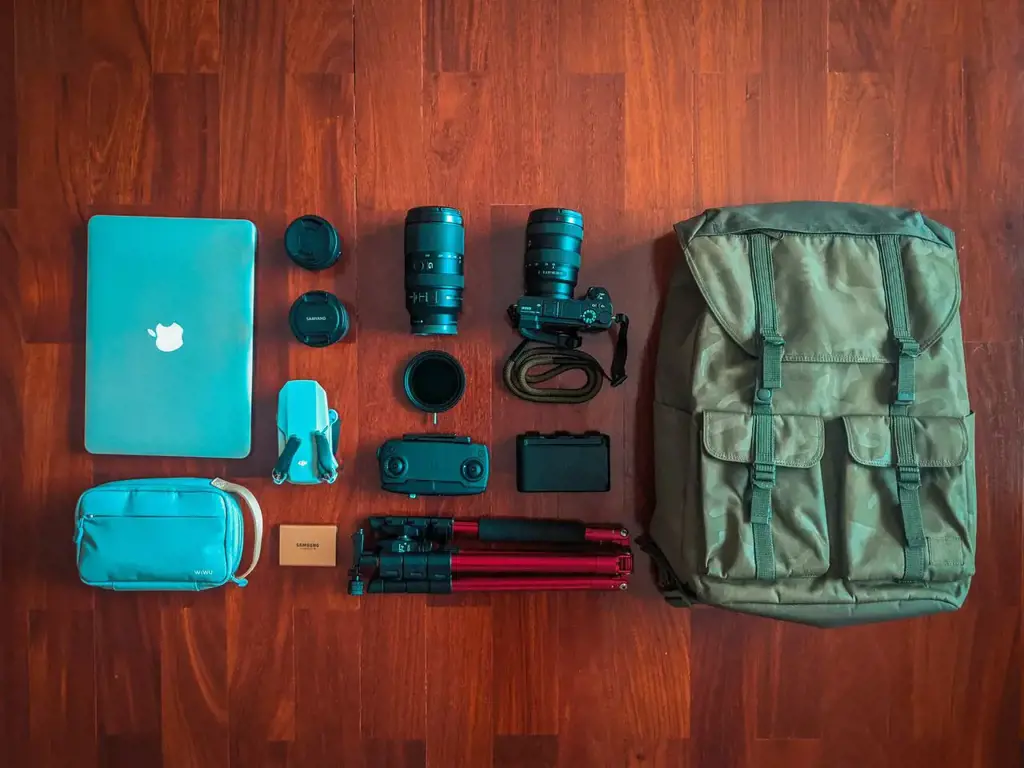
New Zealand is a popular destination for tourists from all over the world, thanks to its stunning landscapes and vibrant culture. If you're planning a trip to this beautiful country, it's important to pack the right items to ensure you have a comfortable and enjoyable experience. Here is a list of essential items to pack for a trip to New Zealand:
- Warm clothing: New Zealand's weather can be unpredictable, so be prepared for all seasons. Even in the summer, the temperature can drop quite a bit, especially in the evenings. Pack a mix of lightweight and warm clothing, including jackets, sweaters, and thermal layers.
- Comfortable shoes: New Zealand is known for its stunning hiking trails and outdoor activities. Make sure to pack a pair of comfortable walking shoes or hiking boots to explore the country's beautiful landscapes. Also, don't forget some flip-flops or sandals for beach days or casual outings.
- Outdoor gear: If you plan to participate in adventure sports or outdoor activities like hiking, kayaking, or camping, it's important to pack appropriate gear. Bring a backpack, waterproof jacket, and pants, as well as items like a hat, sunglasses, and sunscreen for sun protection.
- Power adapter: New Zealand uses a different type of power outlet, so make sure to pack a universal power adapter to charge your electronic devices. This will ensure you can stay connected and charged up throughout your trip.
- Travel insurance: It's always a good idea to have travel insurance when visiting a foreign country. Make sure to purchase comprehensive travel insurance that covers medical emergencies, trip cancellations, and lost or stolen belongings. This will provide you with peace of mind and financial protection during your trip.
- Money and cards: While New Zealand accepts credit cards in most places, it's a good idea to have some cash on hand for smaller establishments that may not accept cards. It's also wise to inform your bank of your travel plans to avoid any issues with your cards while you are away.
- Travel documents: Don't forget to bring your passport, visa (if required), and any other important travel documents. Make sure to keep these in a safe place, such as a travel wallet, to prevent them from getting lost or stolen.
- Medications and first aid kit: If you take any prescription medications, make sure to pack an adequate supply for the duration of your trip. It's also a good idea to bring a basic first aid kit with essentials like band-aids, antiseptic cream, pain relievers, and any other personal essentials.
- Toiletries: While you can easily find toiletries in New Zealand, it's a good idea to pack travel-sized versions of your preferred products. This will save you time and effort in finding the specific items you prefer.
- Entertainment: Long flights and road trips can be boring, so bring some form of entertainment, such as books, magazines, or portable electronic devices, to keep yourself entertained during the journey.
Remember to pack light and practical items for your trip to New Zealand. With the right essentials, you'll be well-prepared to explore the stunning landscapes, experience the vibrant culture, and have an unforgettable time in this beautiful country.
Essential Items to Pack for a Sailing Holiday in Croatia
You may want to see also

What type of clothing should I pack for New Zealand's varying weather conditions?
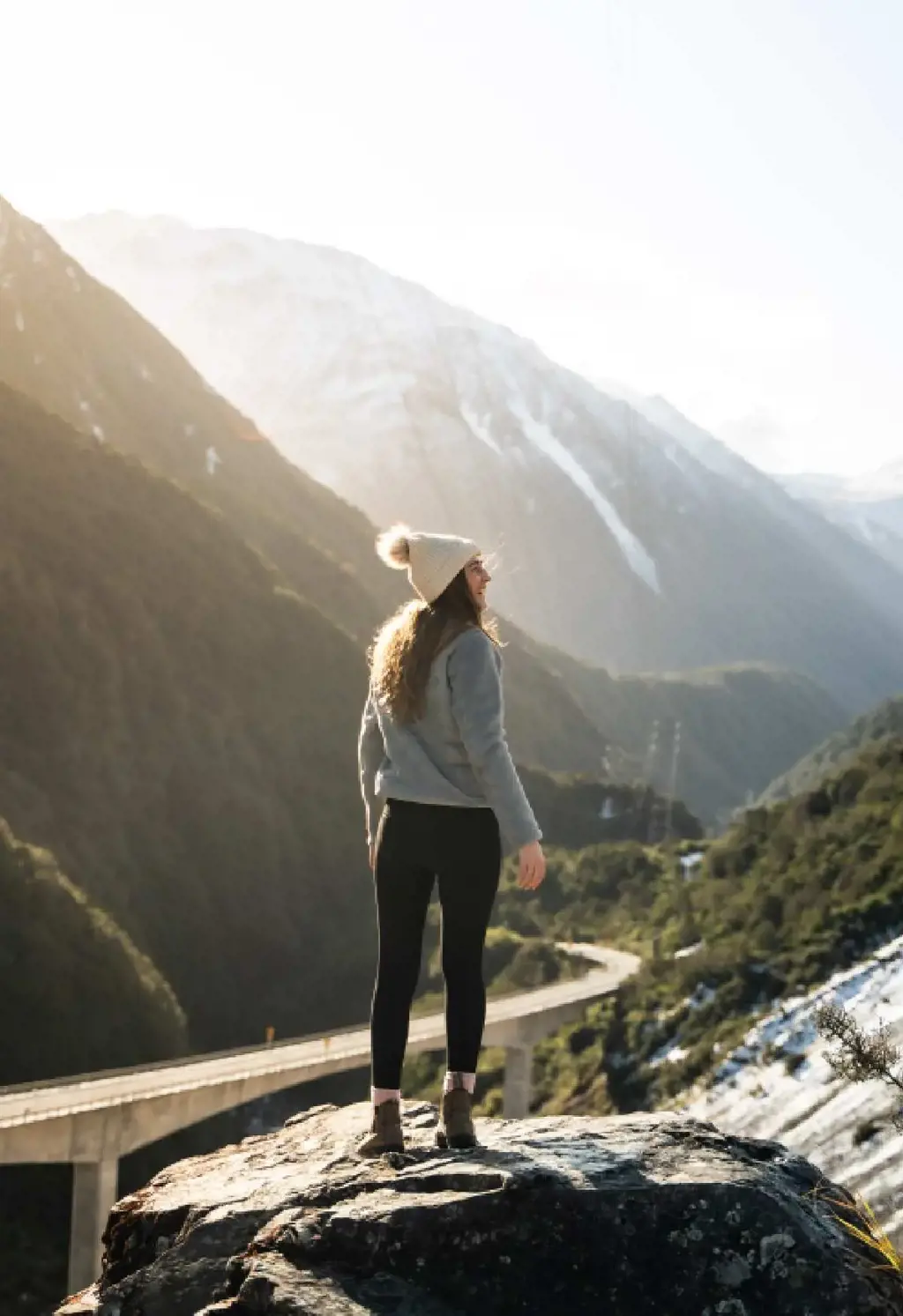
When traveling to New Zealand, it is important to be prepared for its varying weather conditions. The country's location in the southern hemisphere means that the seasons are opposite to those in the northern hemisphere. This can lead to unpredictable weather patterns and rapid changes in temperature. To ensure you are prepared for any situation, it is important to pack a variety of clothing options. Here are some tips on what type of clothing you should pack for New Zealand's varying weather conditions.
Layering is key when it comes to dressing for New Zealand's weather. The country has a temperate climate, with mild temperatures in summer and cool temperatures in winter. However, weather conditions can change quickly, especially in the mountainous regions. By wearing several layers of clothing, you can easily adjust to the changing weather.
Start with a base layer made of lightweight and moisture-wicking material. This will help regulate your body temperature and keep you dry. Merino wool is a popular choice for base layers as it is breathable and insulating. Synthetic materials such as polyester are also a good option.
On top of the base layer, add a mid-layer for insulation. This can be a fleece jacket or a lightweight down jacket. These materials provide warmth without adding too much bulk. It is best to choose a mid-layer that can be easily removed or added as needed.
For the outer layer, invest in a waterproof and windproof jacket. This will protect you from rain, wind, and snow. Look for a jacket with sealed seams for added protection. A hood is also useful for keeping your head dry during sudden downpours. Consider a jacket with pit zips or vents to allow for ventilation during warmer weather.
In terms of bottoms, pack a mix of long pants and shorts. Jeans or hiking pants are suitable for cooler weather, while lightweight and quick-drying shorts are ideal for warmer temperatures. You can also bring a pair of waterproof pants for hiking or outdoor activities in wet conditions.
Footwear is crucial when exploring New Zealand's diverse landscapes. Invest in a sturdy and waterproof pair of hiking boots. These will provide ankle support and traction on uneven terrain. Additionally, pack a pair of lightweight and breathable sneakers or sandals for casual outings.
Accessories such as hats, gloves, and scarves are also essential. These items can protect you from the sun, wind, and cold temperatures. A wide-brimmed hat will shield your face from the sun, while a beanie and gloves will keep you warm during chilly evenings.
Lastly, don't forget to pack swimwear if you plan on visiting New Zealand's beautiful beaches or natural hot springs. A lightweight and quick-drying towel is also useful for outdoor activities.
In conclusion, packing for New Zealand's varying weather conditions requires careful consideration. By layering your clothing, investing in waterproof and windproof outerwear, and having suitable footwear and accessories, you will be well-prepared for any weather situation. Remember to check the weather forecast before heading out and be prepared for sudden changes in temperature. With the right clothing, you can fully enjoy all that New Zealand has to offer.
Essential Items for a One-Year Stay in Hong Kong
You may want to see also

Are there any specific items I should pack for outdoor activities and adventures in New Zealand?
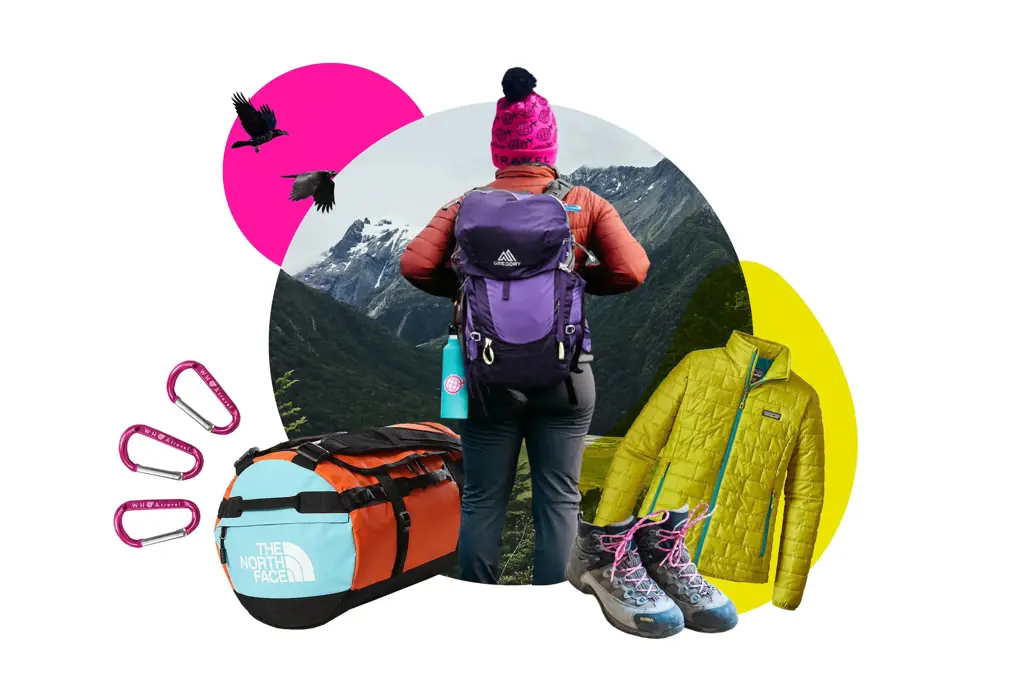
When planning a trip to New Zealand, it is important to pack appropriately for outdoor activities and adventures. The country is known for its stunning landscapes and diverse range of outdoor activities, so having the right gear and equipment is crucial for enjoying your time spent exploring the great outdoors. Here are some specific items you should consider packing for your outdoor adventures in New Zealand.
- Hiking boots: New Zealand offers a multitude of hiking trails, so a good pair of hiking boots is essential. Look for boots that provide ankle support, are waterproof, and have a sturdy sole for traction on various terrains.
- Rain jacket: The weather in New Zealand can change quickly, so it's always wise to have a waterproof rain jacket on hand. Look for one that is lightweight and breathable, so you can easily carry it with you on hikes or other outdoor activities.
- Layered clothing: New Zealand experiences a wide range of temperatures, even during the summer months. It's important to pack clothing that can be layered, allowing you to adjust your attire based on the weather conditions. A mix of t-shirts, long-sleeved shirts, fleeces, and a warm jacket should be enough for most situations.
- Sunscreen and hat: The New Zealand sun can be intense, so be sure to pack sunscreen with a high SPF to protect your skin from harmful UV rays. It's also advisable to bring a wide-brimmed hat to provide additional shade and protect your face and neck from the sun.
- Insect repellent: Depending on the time of year and location, you may encounter sandflies or mosquitoes during your outdoor activities. Pack a good quality insect repellent that will keep these pesky bugs at bay.
- First aid kit: It's always a good idea to carry a basic first aid kit with you when venturing into the outdoors. Include items such as band-aids, antiseptic cream, pain relievers, and any necessary prescription medications.
- Water bottle and snacks: Staying hydrated and nourished is important when engaging in outdoor activities. Bring a reusable water bottle that you can refill throughout the day, as well as some snacks such as energy bars or trail mix to keep your energy levels up.
- Navigation tools: If you plan on doing any backcountry hiking or exploring, it is essential to have reliable navigation tools. A map and compass, or a GPS device, can help you stay on track and navigate your way through unfamiliar terrain.
- Camera or smartphone: With the breathtaking landscapes and unique wildlife that New Zealand has to offer, you'll want to capture your outdoor adventures. Don't forget to pack a camera or smartphone with a good quality camera to capture those memorable moments.
- Outdoor gear rental: If you don't have all the necessary gear or don't want to carry it with you, there are many outdoor gear rental shops throughout New Zealand. They offer renting options for items like camping gear, hiking equipment, and even bicycles for exploring.
In conclusion, packing the right gear is paramount to enjoy outdoor activities and adventures in New Zealand. By packing essentials such as hiking boots, a rain jacket, layered clothing, sunscreen, insect repellent, a first aid kit, hydration and nourishment supplies, navigational tools, and a camera, you'll be well-prepared to experience all that New Zealand's great outdoors has to offer.
Essential Items to Pack for a Memorable Spring Break in Miami
You may want to see also

What travel essentials should I pack for long flights to New Zealand?
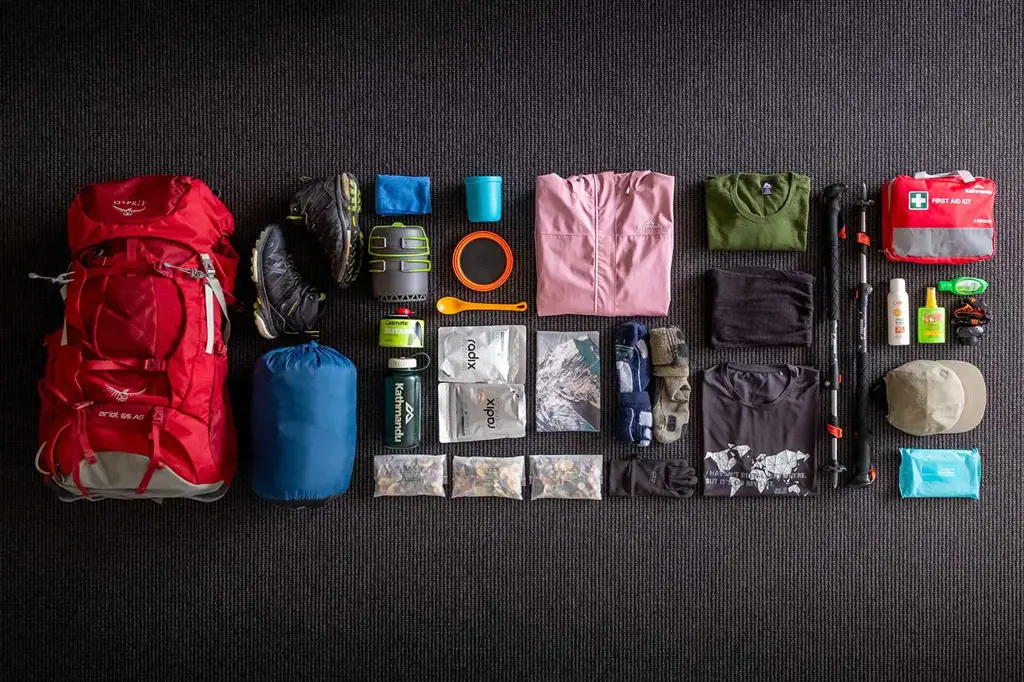
Long flights can be a daunting experience, but with the right travel essentials, you can make your journey to New Zealand more comfortable and enjoyable. Whether you are a seasoned traveler or embarking on your first long-haul flight, packing the following items can help you stay prepared and relaxed throughout the journey.
- Neck Pillow: A comfortable neck pillow is essential for getting a good sleep during long flights. It provides support to your neck and prevents stiffness or soreness.
- Earplugs or Noise-Canceling Headphones: These are a must-have for blocking out the noise of the aircraft and surrounding passengers. Noise-canceling headphones not only eliminate external sounds but also provide high-quality audio for watching movies or listening to music.
- Eye Mask: An eye mask can make a significant difference in your ability to sleep during the flight. It blocks out any unwanted light and helps to create a dark environment conducive to restful sleep.
- Compression Socks: Wearing compression socks can prevent swelling and improve blood circulation, which is crucial during long flights. They can also reduce the risk of deep vein thrombosis (DVT) by promoting healthy blood flow in your legs.
- Moisturizer and Lip Balm: The air inside the aircraft cabin is notoriously dry, and your skin and lips can easily become dehydrated. Carry a small bottle of moisturizer and lip balm to keep your skin hydrated and prevent discomfort.
- Reusable Water Bottle: Staying hydrated is essential during long flights, as dehydration can lead to fatigue and other discomforts. Bring an empty, reusable water bottle and fill it up after going through security. This way, you can have access to water throughout the flight without relying on single-use plastic cups.
- Snacks: Airplane food may not always be to your liking, or you might get hungry between meals. Pack some light snacks like granola bars, nuts, or dry fruits to keep your energy levels up and satisfy hunger pangs.
- Entertainment: Long flights can get boring, so be sure to carry some form of entertainment such as a book, an e-reader, or a tablet loaded with movies, TV shows, or games. Having something to keep yourself occupied can make the journey seem shorter.
- Inflatable Travel Pillow: In addition to the neck pillow, an inflatable travel pillow can provide extra comfort and support. It can be used to prop up your feet or create a makeshift footrest, enhancing your overall comfort.
- Travel Documents: Last but not least, don't forget to pack all your travel documents, including your passport, visa, travel insurance, and any necessary vaccination records. Make sure to keep them in a secure and easily accessible place.
By packing these travel essentials, you can ensure a more comfortable and enjoyable long flight to New Zealand. Remember to consider your personal preferences and needs when deciding what to bring, and make adjustments accordingly. With the right preparation, you can make the most of your journey and arrive in New Zealand feeling refreshed and ready to explore.
Essential Items to Pack for Your Trip Down South
You may want to see also

Are there any important documents or paperwork I need to bring for my trip to New Zealand?
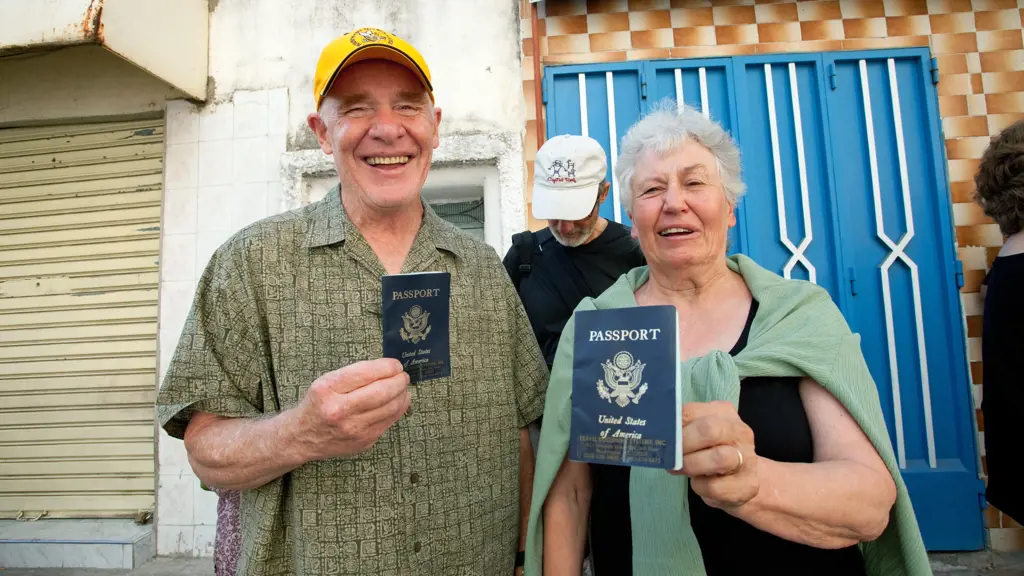
When planning a trip to New Zealand, it is essential to ensure that you have all the necessary documents and paperwork in order to avoid any potential complications or inconveniences during your travels. Whether you are visiting for tourism, business, or any other purpose, here is a list of important documents you should bring with you:
- Passport: Your passport is the most crucial document you will need for your trip to New Zealand. Ensure that your passport is valid for at least three months beyond your intended departure date from New Zealand. If your passport is not valid or will expire soon, it is recommended to renew it before traveling.
- Visa: Depending on your country of origin, you may require a visa to enter New Zealand. It is important to check the New Zealand immigration website or contact the nearest New Zealand embassy or consulate to determine if you need a visa and if so, how to apply for one.
- Travel insurance: While not a mandatory requirement, it is highly recommended to have travel insurance that covers medical expenses, trip cancellation, and lost or stolen belongings. New Zealand has an excellent healthcare system, but medical costs can be high for non-residents, so having travel insurance can provide peace of mind.
- Flight tickets: Ensure that you have your flight tickets booked and printed or saved on your mobile device for easy access. It is also a good practice to check your flight details and any necessary layover or connecting flight information.
- Itinerary: It is advisable to have a detailed itinerary of your trip, especially if you have planned multiple activities or destinations. This will help you stay organized and ensure you don't miss out on any must-see attractions or experiences.
- Accommodation details: Have a copy of your accommodation booking confirmations or reservation details readily available. This will make check-in procedures smoother and can be a useful reference in case any issues arise.
- Driver's license: If you plan to rent a car or drive in New Zealand, make sure to bring your valid driver's license from your home country. In some cases, you may also need to obtain an international driving permit (IDP) depending on your country of origin.
- Credit cards and emergency contact numbers: Bring at least one major credit card with you for emergencies and general expenses. Also, note down important emergency contact numbers, such as your country's embassy or consulate in New Zealand, your credit card provider, and your travel insurance company.
It is important to note that the above list is not exhaustive, and additional documents or paperwork may be required based on your individual circumstances or the purpose of your visit to New Zealand. It is always recommended to check the official New Zealand immigration website or consult with relevant authorities to ensure you have all the required documents for a hassle-free trip.
In conclusion, when planning a trip to New Zealand, it is crucial to gather all the necessary documents and paperwork to ensure a smooth and enjoyable travel experience. From a valid passport and visa (if necessary) to travel insurance, flight tickets, and accommodation details, these documents will help you navigate through customs, immigration, and any unforeseen circumstances that may arise during your trip. Remember to check the official immigration guidelines and consult with the relevant authorities to ensure you have all the required documentation before embarking on your journey to New Zealand.
Essential Packing Guide for 36 Hours in Memphis
You may want to see also
Frequently asked questions
When packing for a trip to New Zealand, it's important to consider the varying weather conditions. Be sure to pack a mix of both warm and cool clothing, as temperatures can fluctuate between regions and seasons. It's also a good idea to pack comfortable shoes for walking and hiking, as New Zealand is known for its stunning landscapes and outdoor activities.
Yes, it's highly recommended to bring a rain jacket for your trip to New Zealand. The weather in New Zealand can be unpredictable, and rain showers can occur at any time. Having a lightweight, waterproof jacket will help protect you from the rain and keep you dry during your outdoor adventures.
While New Zealand is generally considered to be free from dangerous insects, it's always a good idea to pack insect repellent for your trip. Mosquitoes, sandflies, and other biting insects can be present in certain areas, especially during the warmer months. Applying insect repellent will help prevent bites and make your outdoor experiences more enjoyable.
In addition to clothing, shoes, a rain jacket, and insect repellent, it's important to pack other essential items for your trip to New Zealand. These may include a reusable water bottle, sunscreen, a hat, sunglasses, a power adapter for electronic devices, a small first aid kit, and any necessary medications. It's also a good idea to bring a sturdy backpack or daypack for carrying your belongings during day trips and hikes.


